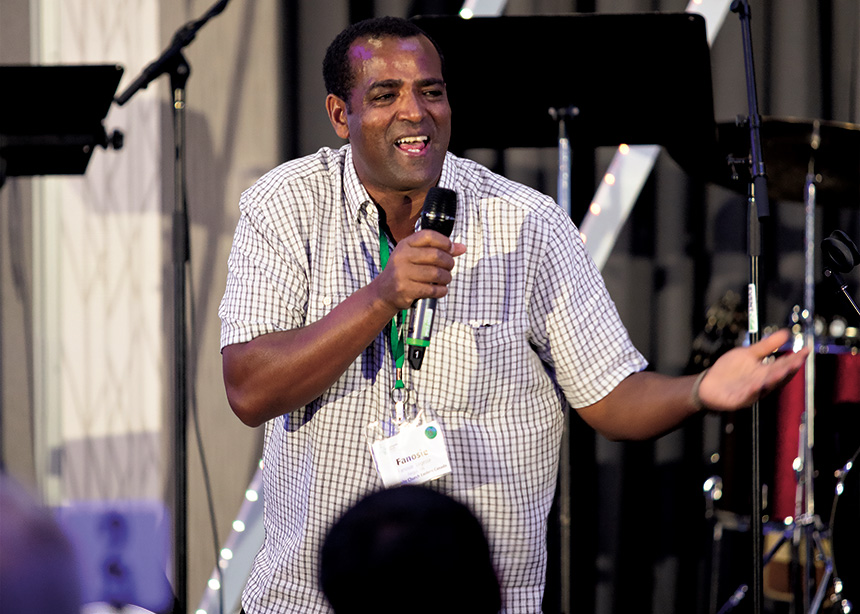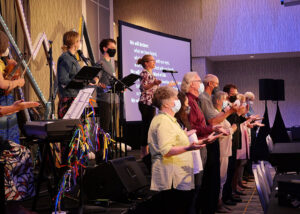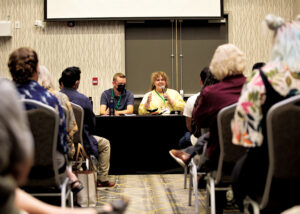In this issue you will find reports about Mennonite Church Canada’s Gathering 2022. Recently over 300 of us met in person and virtually to explore the theme, “We declare.”
I was impressed by the turnout of delegates in Edmonton and by the engagement of younger folks in the business sessions, worship times, workshops and on social media (#WeDeclare2022). Participants seemed happy to renew in-person connections and to celebrate together the faith that sustains us. I was moved by the power of the “We Declare” statement we spoke and acted out in the worship times.
Throughout the four days, we experienced an overall cooperation with the wearing of masks, even though—for some attendees—that pandemic practice is no longer happening in their own communities and congregations. We saw a generous spirit on the part of the local volunteers, who dedicated a holiday weekend to host and serve out-of-town visitors.
The keynote speakers pointed often to the good news of loving and authentic relationships: between humans and God and between neighbours and strangers in our own communities. There was much wisdom to reflect on and live into.
It’s clear that we as a church want to be a part of God’s good news. And yet, something was largely missing from the conversations at Gathering 2022: the e-word. Evangelism. Or witness and proclamation—words that one would associate with the act of declaration.
One can perceive a divide within the Mennonite church in Canada between those of us who see evangelism as the primary calling of the church and those of us who relegate evangelism to a regrettable chapter of church history. Some of us proclaim boldly a message of salvation while others of us tie that kind of proclamation to harmful practices of colonialism, racism, patriarchy and more.
That divide is present in our corporate life and sometimes even within our individual souls. So, we need more occasions for having honest and compassionate conversation about how the gospel is proclaimed. It is vital that we as a church move beyond the events of one weekend and keep exploring together the meaning of “We declare.”
Are there ways to bridge the divide in how we understand our role as Christian communities? What do we do with calls from some marginalized groups for the church to step away from its traditional way of ministering among them? How do we understand Jesus’ “Great Commission” in the 21st century? What might it look like to make disciples in our contexts?
Mennonite Church Canada has offered the invitation for reflection and conversation using the digital resource, “We Declare What We Have Seen and Heard: A Study Guide and Sermon Series for our Nationwide Community of Faith.” This six-session guide grounds the conversation in Old and New Testament scriptures and invites individuals and congregations to consider how we fit into God’s grand mission of reconciliation. It asks, “Can we renew our joy in the gospel so that our words and actions are truly good news for us and our neighbours?” and “How might your congregation better integrate words and actions so that your gospel witness is not simply one or the other, but both?”
To accept this invitation, you can start by downloading the guide from CommonWord. You can watch a preview video below.
A thank you
This month Canadian Mennonite staff says goodbye and thank you to intern Daisy Belec, who joined us during her summer break from university studies. Daisy made her contribution primarily through CM’s social media platforms, serving with dedication and commitment. She says, “My few months with Canadian Mennonite have taught me years-worth about how to live out my faith passionately and actionably. Between the wonderful people I have been working with this summer, those I have interviewed, and those whose stories I have read by talented professionals, I feel inspired and equipped to step out into the world and say, “I have something to offer through the power of Christ in me.”
A reminder
The next issue, dated Sept. 5, will be released in a digital-only format. Subscribers can watch for it in their email inbox, and individual articles will be accessible at canadianmennonite.org.
More Gathering 2022 coverage:
Gathering 2022: MC Canada invited to declare and embody the gospel
A focus on rest and renewal
‘Do you hear what I hear?’
In This Together aims to widen the circle of inclusion
Read more editorials:
Exploring the Anabaptist family online
Notes from afar
‘Following’ Mennonites








Leave a Reply
You must be logged in to post a comment.